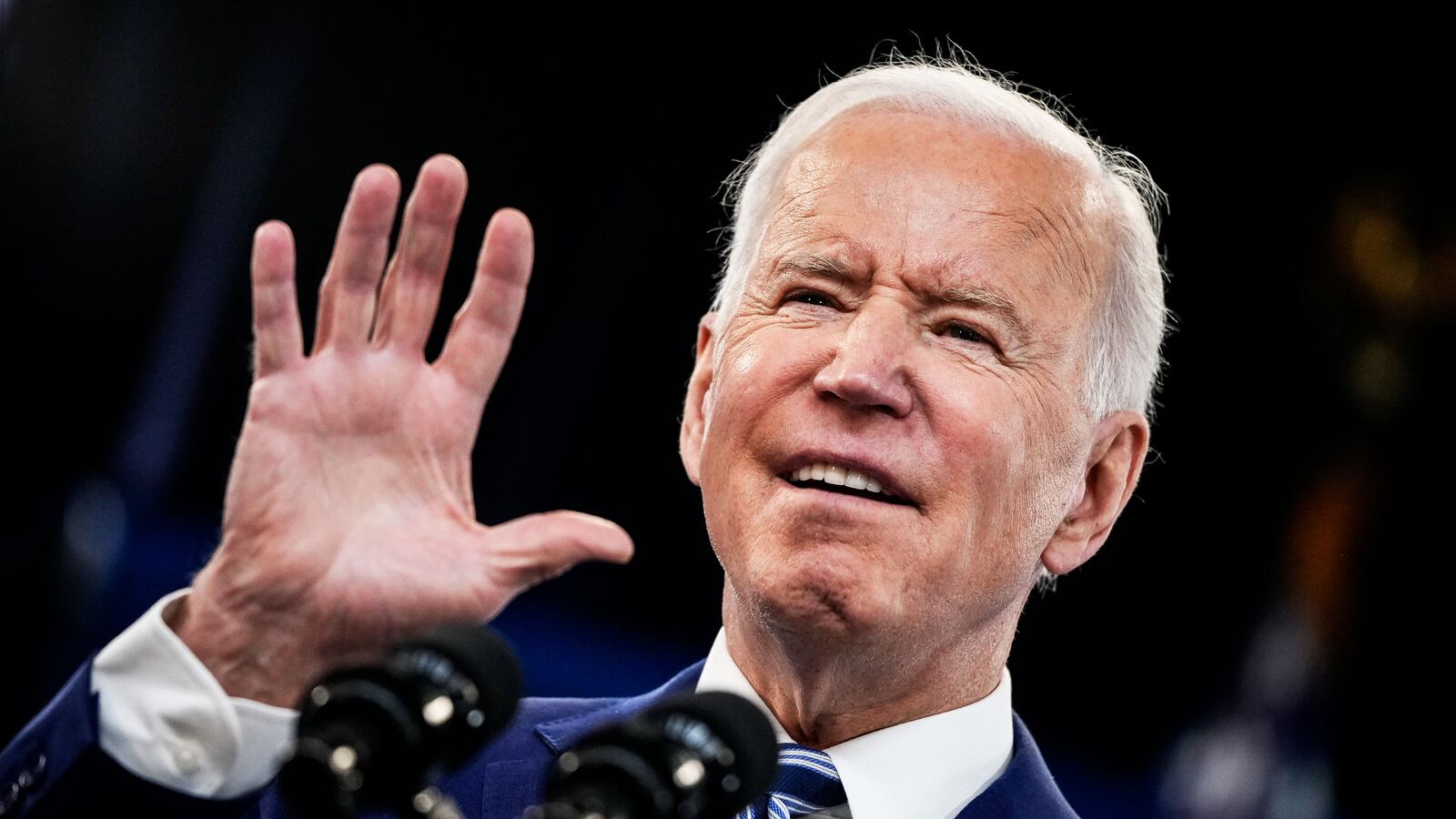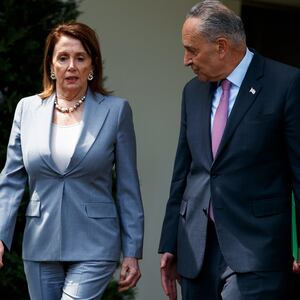When President Joe Biden signed into law the most progressive bill in a generation just weeks ago, Republicans stood and watched as Americans celebrated the arrival of stimulus checks and big government solutions.
But with Biden’s introduction of a multi-trillion-dollar infrastructure plan on Wednesday, the GOP is convinced they’re getting a better shot to sink a liberal agenda—and the Democratic Party’s political fortunes.
Republicans seemed dumbfounded about what to say when Democrats passed their $1.9 trillion stimulus bill in March. They argued it was both too large and insufficient. They said it would disincentivize work, while unemployed people called it a lifeline. And they complained about the process, with those arguments falling largely on the deaf ears of Americans who cared more about getting a stimulus check than they did about which Republicans didn’t get a vote on their amendments.
Polling confirmed the scattershot attacks moved virtually no one. In one Pew Research survey, 70 percent of Americans support the legislation, with even 41 percent of Republicans favoring it. In town halls after the bill’s passage, GOP lawmakers attacked the process and claimed the bill didn’t actually address the pandemic—some even claimed credit for projects in the bill they voted against. Meanwhile, their constituents just wanted to know where their checks were. Republicans moved on to talking about immigration and Dr. Seuss.
So as lawmakers prepare for their next legislative battle, some Republicans are looking to learn from their earlier messaging mistakes—while others think a massive infrastructure bill will naturally lend itself to greater opposition than a bill that put $1,400 into the pockets of most Americans.
“If the infrastructure bill becomes a Christmas tree, they’re going to have the same problem,” Rory Cooper, a longtime GOP strategist and current managing director of Purple Strategies, told The Daily Beast.
He said Democrats were smart to include so many different items in these bills because it made it difficult for Republicans to mount arguments against it. And he admitted that Republicans largely failed to turn voters against the stimulus.
“They had a hard time having a cohesive, this-is-the-reason-why-it-shouldn’t-be-passed message,” Cooper said.
On Capitol Hill, GOP aides acknowledge that their party blundered their stimulus messaging. Most say they were dealt a tough hand, but admit that Democrats outflanked them on the branding, solidifying the package as a COVID relief bill and blowing through their attempts to define the legislation as the “Pelosi Payoffs to Progressives Act.”
But many in the party believe the fundamentals of the stimulus bill—done at top speed and packed with popular, quick-hitting benefits—may have been a unique opportunity for Democrats. A sweeping infrastructure package chock-full of climate change provisions, tax increases for some, tax cuts for wealthy property owners, and a “big government approach” to infrastructure would present Republicans with plenty of messaging opportunities, a senior GOP aide told The Daily Beast.
“This is a different beast than direct payments to individuals,” this senior GOP aide said. “They feel like this is their window to sort of ram something through, and if history tells us anything, it’s that it’s not going to work well for them down the road.”
“There’s going to be a lot of push back on what this ends up being,” the aide added.
The final nuts and bolts of the bill remain unclear, but details revealed ahead of its formal introduction indicated an opening price tag of just more than $2 trillion over the next 10 years. The total includes $650 billion for infrastructure projects likes roads and bridges, $400 billion for home care for the elderly and disabled, $300 billion for affordable housing, $300 billion for manufacturing, $180 billion for research and development, and $100 billion each for the nation’s waterways, the electric grid, high-speed broadband, and job retraining.
On a press call on Tuesday night ahead of the president’s remarks, an administration official told reporters that while they foresee the passage of a corporate tax reform plan offsetting the full cost of the plan over the next 15 years, the expenditures “are investments that as a country we cannot afford not to make.”
“This is a moment where, by moving and actually getting done something that has had broad bipartisan support in the past, we can demonstrate to the American people that the type of historic and galvanizing public investment programs we’ve had in the past… can revitalize our national imagination,” the official said, “and put millions of Americans to work right now.”
And that is before individual Democrats put their own thumbprints on the legislation or add potentially $1 trillion in tax cuts. The overall price of the package could swell much higher with changes as Biden and Democratic leaders try to build a majority with or without GOP votes.
Still, Republican strategists warned that GOP lawmakers could fall into a trap by just raging against the overall price tag. Voters seem less outraged by big numbers after both parties passed trillions in relief during the COVID crisis. And, as Cooper said, Republicans lost a good bit of messaging leverage on spending during the Trump administration.
“People just don’t buy the spending argument, because money is flowing like water in Washington,” he said.
Instead, Republicans seem intent on focusing heavily on the legislation’s climate proposals and tax provisions, according to a senior House GOP aide. In fact, Republicans are already preparing their lines of attack even before Biden fully unveils the bill.
Republicans believe they will have a much easier time persuading the public that the Democrats’ infrastructure is less an infrastructure plan than a climate wish list. They will make heavy use, for example, of recent comments from Rep. Alexandria Ocasio-Cortez (D-NY), in which she touted this bill as a vehicle for ambitious climate provisions like those in her Green New Deal.
“It’s not ridiculous to assume we’re going to label this the Green New Deal, because even their own members admit that those proposals are a major part of this effort,” this senior GOP aide said. “There’s a lot for us to go on offense on, and I think you’ll see pretty united Republican opposition to something like this.”
House Transportation and Infrastructure Committee Chairman Peter DeFazio (D-OR) said in February that the infrastructure plan would draw heavily from a previous bill the House passed last July, which attracted three GOP votes. “We're going to deal with climate change and create a hell of a lot of jobs in this country,” he said. And if DeFazio’s legislation is the template, Republicans will have a starting point to reintroduce the Green New Deal attacks they are sharpening right now.
But even that strategy presents potential pitfalls for Republicans.
Biden is under immense pressure from a broad swath of his party to use this legislation as a vehicle to achieve ambitious climate goals, like implementing tougher emissions standards and investing in renewable energy. Progressives have also urged Biden to develop “human infrastructure” by funding child care programs and housing initiatives, and establishing universal pre-kindergarten. Sen. Ron Wyden (D-OR) is even angling to include recurring stimulus checks in the package.
If Republicans manage to cast the infrastructure bill as a sweeping climate bill or progressive wishlist, they may actually energize many liberal voters and endear Biden to the far-left, while still failing to convince moderates that Biden is an extreme liberal.
Rep. Jake Auchincloss (D-MA) said he would gladly support making the 2022 midterms a referendum on the climate, infrastructure, economic, and social programs Democrats want to advance in this bill. “I absolutely will go door to door talking about raising taxes on corporations and the ultra-wealthy in order to fund a jobs and infrastructure program for transportation, clean energy, clean water, and universal childcare,” Auchincloss told The Daily Beast.
If Republicans resort to lockstep, unequivocal opposition to the infrastructure, Auchincloss said, they’ll lose the war of public opinion one more time. “They're going to end up with the American Rescue Plan again, with that kind of scenario, opposing a bill that is broadly unifying,” he said.
There could be another key difference between the infrastructure plan and the stimulus: time. Republicans believe it’s unlikely that, however quickly Biden can feed money to infrastructure projects, few programs could match the instant, nation-wide impact of direct stimulus checks.
That could present an opportunity for Republicans to define the legislation before Democrats can, as voters see a massive price tag but little change in their own communities.
But in the long run—just as President Barack Obama did with his American Recovery and Reinvestment Act and the road signs marking that this project was funded by the 2009 stimulus—infrastructure improvements will touch most corners of the country, from better roads to universal broadband. There will be tangible improvements that voters will be able to see before the 2022 midterms and the 2024 general election.
Plenty of Democrats are arguing their success winning the PR war on the COVID bill should give Biden a major reason to be even more ambitious in his infrastructure package.
“It’s a sign for the president, and I think it’s why he has said he wants to be bold about the packages,” said Rep. Pramila Jayapal (D-WA), chair of the Congressional Progressive Caucus, on Tuesday. “I think he sees that people are hungry for us to do the things that are popular, and populist, across the country, and I do believe he’s very committed to that.”
with additional reporting from Scott Bixby







